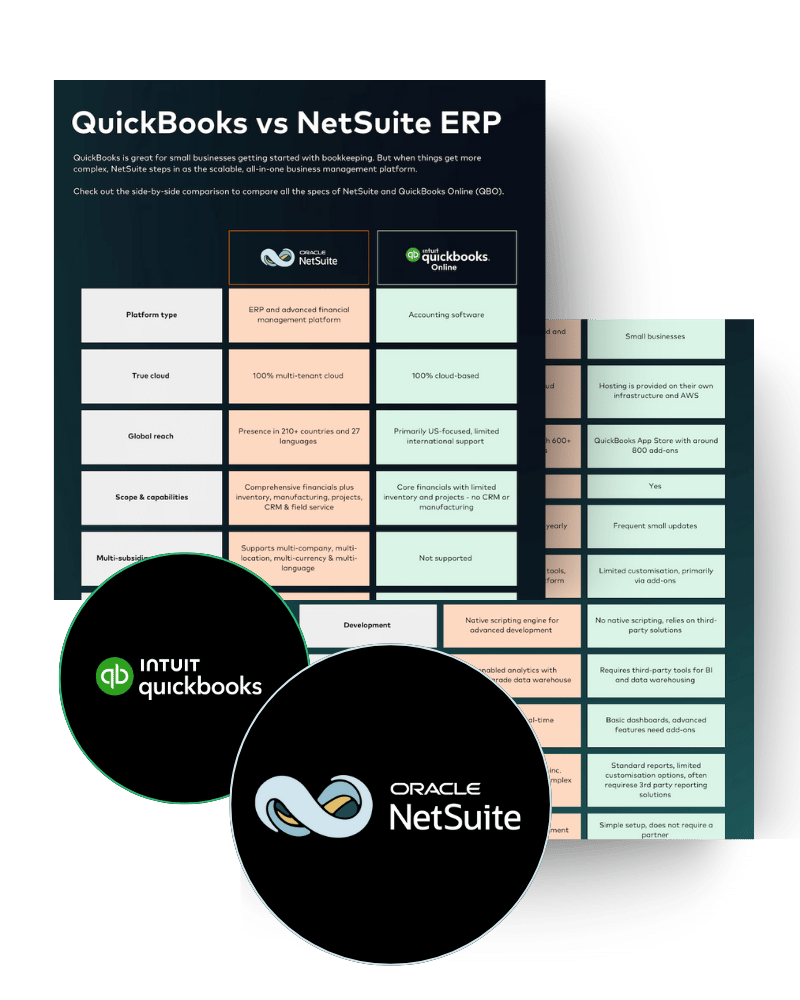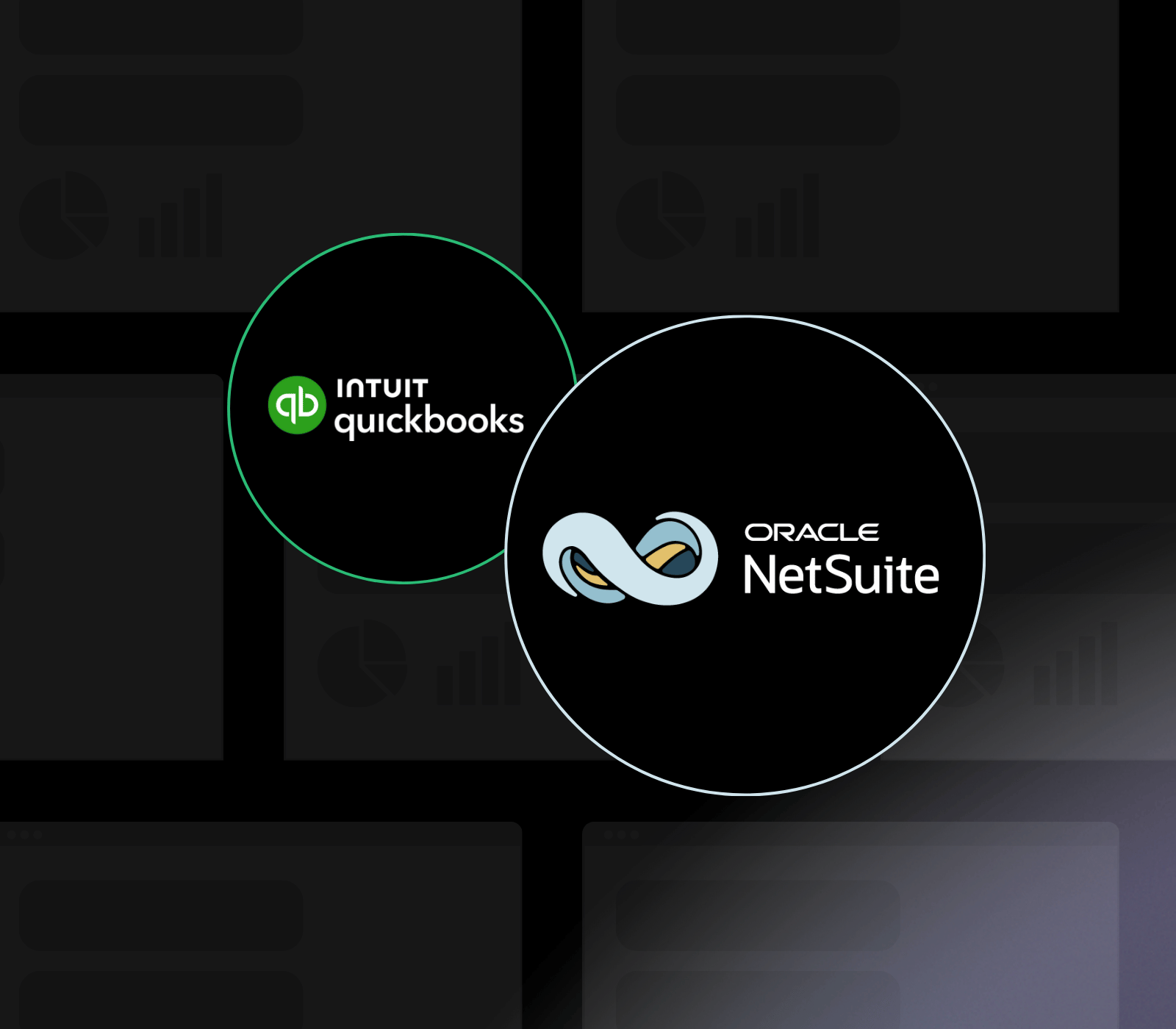QuickBooks got you started. NetSuite gets you further.
-
Built to scale
NetSuite handles multi-entity operations, complex financials and growing data volumes, without the bolt-ons or spreadsheets QuickBooks relies on.
-
Visibility you can trust
From inventory to profit margins, NetSuite delivers a real-time, consolidated view of your entire businesss there’s no more conflicting data or manual workarounds.
-
Run it your way
Adapt workflows, customise dashboards and integrate your third-party platforms. NetSuite flexes to fit your growth model, however complex it gets.
Understanding NetSuite vs QuickBooks
-
See NetSuite ERP in action
There’s no better way to explore how NetSuite ERP can benefit your organisation than by experiencing it firsthand.Request a product tour

FREE INFOGRAPHIC
Compare NetSuite and QuickBooks
Download our feature-by-feature comparison infographic to see how NetSuite outperforms QuickBooks for complex business needs.
Questions to ask before you choose
QuickBooks works well for small businesses with straightforward accounting needs, but it starts to show limitations when businesses scale. NetSuite is built for growth from the outset with multi-entity consolidation, intercompany automation and robust audit and compliance tools. That makes it far easier to adapt as your structure evolves.
NetSuite includes native inventory, warehouse and order management capabilities, all integrated with your financials. QuickBooks typically relies on third-party add-ons for these functions, which can lead to sync issues, delayed data and limited visibility across the fulfilment cycle.
QuickBooks provides standard reports suited to basic bookkeeping, but lacks the depth needed for strategic decision-making. NetSuite offers powerful custom reporting and forecasting via SuiteAnalytics and NetSuite Planning & Budgeting – enabling finance teams to analyse trends, model scenarios and respond with confidence.
No. NetSuite is modular and highly configurable, which means you can start with the essentials and expand as your needs grow. Annexa helps right-size the solution to match your current operations, while planning for future scale.
Despite its broader functionality, NetSuite’s customisation layer is designed for non-technical users. You can adjust workflows, fields, dashboards and approvals with clicks-not-code and extend deeper via SuiteCloud when needed-without relying on third-party apps or workarounds.
NetSuite is designed with global operations in mind – supporting 190+ currencies, country-specific tax rules and automated consolidations across subsidiaries. QuickBooks is best suited to single-entity, domestic businesses and can create friction when expanding into new markets.
NetSuite is a premium platform with far greater functionality. We help businesses understand the full ROI – factoring in time saved, manual processes replaced and systems consolidated.
No. Annexa ensures critical financial and operational data is securely migrated so you retain business continuity, auditability and comparative reporting.
Move beyond small business systems
-
A system that grows with you
NetSuite supports your next chapter with built-in multi-subsidiary capability, flexible customisation and global readiness from day one.
-
From patchwork to performance
Unify finance, CRM, inventory and more in a single system and give your teams the clarity to act fast and execute on strategy.
Frequently asked questions about NetSuite
Yes. NetSuite’s OneWorld architecture supports multi-entity structures, with consolidated reporting, intercompany eliminations, and local tax compliance built in.
Yes. NetSuite includes native modules for inventory, warehouse, fulfilment and procurement often far beyond what’s available in QuickBooks without adding third-party solutions.
While timelines vary, most QuickBooks to NetSuite projects are delivered within 12 – 20 weeks. Annexa provides a detailed roadmap based on your structure, data and priorities.
Absolutely. We regularly connect NetSuite to eCommerce, payroll, CRM and industry tools using native integrations or middleware like Celigo.
let’s chat
Start your journey with Annexa
Request a one-on-one meeting with an Annexa NetSuite expert to discuss your unique challenges and opportunities.
- ✓ NetSuite ecosystem experts
- ✓ Leaders in integration
- ✓ Award-winning team
- ✓ Strategic partner network
- ✓ Innovation always




